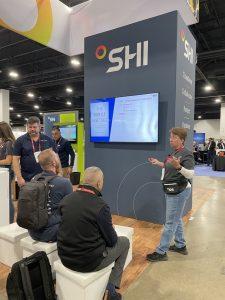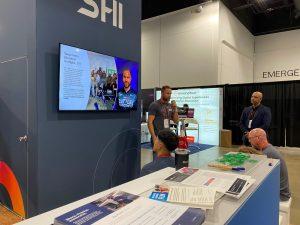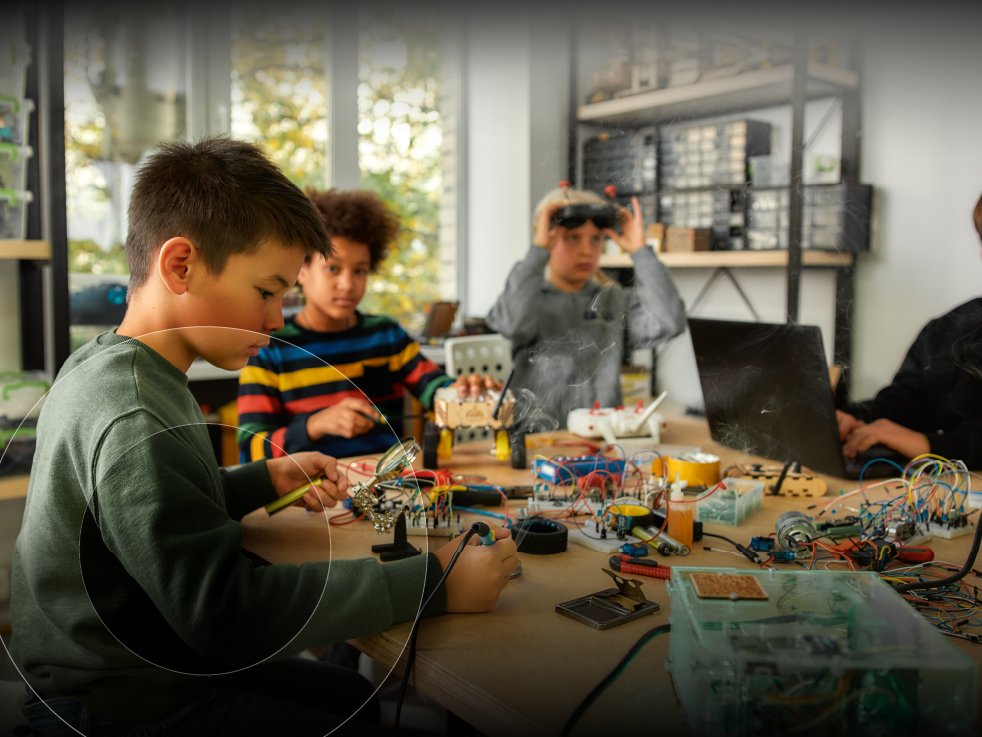EDUCAUSE 2022 Annual Conference: You’ll never believe what classrooms are capable of:
Blackboards are out; headsets are in.

Classrooms, like all landscapes, are everchanging. And if the 2022 EDUCAUSE Annual Conference is any indication, the higher education sector is in for a seismic shift.
At the Denver gathering October 25-28, solution providers forecasted the groundbreaking future of the classroom. SHI was onsite to trace the cutting-edge trends, and help you be a part of them as well.
Flexibility in education spaces
For many colleges, space is the one thing they’re not making any more of. Therefore, institutions are aiming for multifunctionality in their facilities, redesigning rooms to serve multiple functions throughout the day. This involves utilizing new technologies in underutilized spaces, ultimately reconfiguring areas to reimagine their purpose.
However, this type of reconstruction isn’t without its challenges. Schools can find themselves struggling to identify exactly how they can adjust their campuses in order to substantially enhance students’ learning experiences. This can be especially difficult without outside perspective. Many schools that build new personalized experiential learning spaces also rarely think about how to leverage these facilities with other stakeholder organizations or the citizenry at large. Fortunately, SHI can help institutions identify ways to market their spaces and partner with other organizations that may want to utilize them. With our consulting, no space goes wasted.
Nevertheless, the student experience within those spaces is changing more drastically than you might expect.
Hybrid/HyFlex learning environments
For most schools, there actually is one type of space they’re making infinitely more of: the virtual kind. As we collectively recover from the pandemic, more universities are looking for innovative ways to serve both at-home and in-person learning environments. That means finding technology that creates high engagement for students without increasing prep time for instructors.
The solution? HyFlex classrooms, which can serve both sets of students at once, regardless of their environment (physical or virtual) or learning style (synchronous or asynchronous). Whereas all students in a hybrid course are expected to undertake the same combination of online and in-person activities, the more “flexible” HyFlex approach gives students a choice in how they engage with the course. This is accomplished through live closed captioning, bigger screens, and even an instructor’s virtual reality (VR) avatar who can walk around a classroom or engage in 1:1 conversation—more on that later.
In the teaching space of tomorrow (and at EDUCAUSE), questions are being asked that shake the bedrock of our education habits, questions like “Do we even need boards? Or classrooms? Or class times?” By all indications, the answer is no.
For more answers about engaging with students in all environments, SHI is on call to help you embrace these innovative opportunities and technologies. The most transformative tech, however, is one that might literally make your head spin.
VR and esports
Perhaps nothing is shaking up the traditional classroom more than VR, and the tremors are far-reaching. An increasing number of institutions are weaving this technology into existing curriculum. In this way, VR creates new, safer, cost-effective spaces in which students can develop difficult relevant skills. Tomorrow’s doctor is practicing surgery in a VR headset today. With skill-based hiring on the rise in many industries (rather than college requirement), prospects like this one are undoubtedly exciting, and SHI’s partnerships with VR content creators exist to make it your (non-virtual) reality. HTC is one such partner, and was a highlight of EDUCAUSE. Their equipment emphasizes a holistic, full-body experience in the virtual world, which could enhance the learning experience in unparalleled ways.
As EDUCAUSE made clear, esports is yet another landmark way that institutions are evolving. Increasingly, universities are recognizing esports as a widely connected industry, not just a hobby. They see the correlation between esports and enrollment, engagement, and inclusivity; however, those in the beginning stages of an esports initiative might need support with its launch. While IT directors and staff are now being asked to start programs, they often lack backgrounds in esports.
“I was told I need to get an esports team…What do I do?”
On this front, SHI can share our beginner steps and resources through our easily scheduled consultations. Conversations with us are more important now than ever. Universities are recognizing that a well-crafted esports program puts students on track to obtain positions in:
- Event production technology
- Infrastructure
- Engineering
- Gaming software development
- Marketing
As surprising as these developments are, they are not the only revolutionary, retention-driven tools that were showcased on the EDUCAUSE floor.
Students success platforms
As earthquakes and other natural disasters are predictable with technology, there is now a way to forecast a much more human kind of catastrophe: student failure. New platforms utilize artificial intelligence that focuses on proactively identifying struggling students, serving as an “early warning” sign before they fall too behind in their studies. This AI tracks several factors, including:
- Attendance
- Grades and previous failures
- Exit assessments for instructors to spot gaps (and offer reteaching or office hours)
- Social-emotional intelligence
Not only does this technology identify problematic factors but it also offers solutions. In the case of a student’s social-emotional distress, the artificial reality program can reduce anxiety or stress, thereby improving academic performance.
Security is also a chief concern among solution providers and institutions. Safe storage of student data is at the forefront of all purchases. Additionally, as more colleges and universities are realizing that virtual instruction will be included their offerings, increasing security to create a credible testing environment is priority. With this in mind, proctoring software is often being demanded in higher education to improve testing integrity. Schools are becoming well-versed in how students may cheat and so is the AI used to combat it. The software monitors multiple issues and will raise flags if:
- Phones appear on screen and take pictures
- Students screenshot test questions or share them on social media
- Students open other applications during the assessment
- Other people enter the testing room
The technology even has eye-tracking capabilities to make sure students are focused on the assessment at hand.
If institutions are exploring terra nova in their teaching methods, they must be equally probing in their security to preserve the integrity of their entire academic environment. Luckily, innovation is here to accommodate, and so is SHI.
New partners for new horizons
The technology presented at this year’s EDUCAUSE conference will unquestionably expand the capabilities of what colleges can do for their students. The landscape is indeed shifting; SHI won’t let you fall through the cracks.
Take the first steps by sending an email to esports@shi.com or by visiting www.shi.com/esports to schedule a consultation call with our multifaceted team. As with students, every institution has unique needs, and SHI can help devise a differentiated plan to support you.
Let’s explore new spaces together today.







